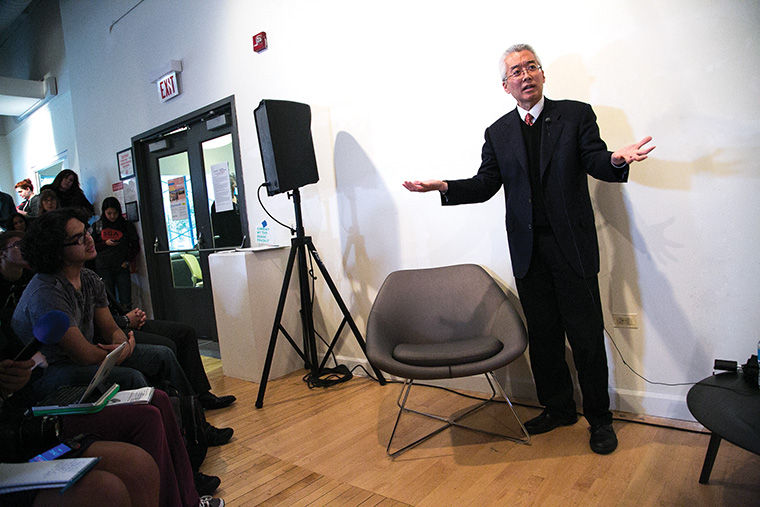Kim addresses student success
President Kwang-Wu Kim spoke with students about success after graduation on Oct. 16 at a forum hosted by the Student Government Association.
October 20, 2014
More than 100 members of the college community filled Hokin Hall in the Wabash Campus Building, 623 S. Wabash Ave., Oct. 16 to munch on pizza and talk with President Kwang-Wu Kim with one broad topic in mind— student success.
Kim answered questions from students about scholarship support, graduation rates, student loan debt and the college’s rank by Washington Monthly Magazine as one of the worst colleges in the country. He also said the college will be incorporating perspectives from the college community for the drafting of its strategic plan.
“Part of what I need to understand is how our students think about success,” Kim said. “We’re in a central planning year, and student success is a central pillar of that plan, so … I’m looking for lots and lots of different kinds of feedback.”
Having input from the students allows the administration to better shape its strategic plan, but the administration cannot create a plan without determining the desired results first, Kim said.
Though hearing the community’s input allows for a more well-rounded decision, it takes longer to make significant changes, he said.
“Our job right now is to move quickly enough without ignoring the shared governance piece,” Kim said. “I see how important the institution is. I want this place to be celebrated as an essential institution that’s doing something different.”
Students expressed concerns including graduating with student loan debt, the college’s poor rank in terms of student loan default rates
and maintaining the college’s “live what you love” philosophy during upcoming restructuring.
Regarding the college’s ranking as the 11th worst college in the country in late September, Kim said that the rankings were arbitrarily based on 2011 statistics, adding that the college was then admitting applicants with little to no chance of graduating.
Now, the college is selectively admitting students based on whether they are likely to complete their studies and simultaneously increasing scholarship support for students, he said.
Kim said the administration must make sure students can pursue their careers and obtain steady employment, not one or the other.
The president shared anecdotes about his years after graduate school and his struggles to maintain employment, adding that students’ successes will come from connections they make and their skill sets.
“That was a really, really bad place to be in the world knowing that I was really good at something and having no clue how to connect what I knew how to do with the people around me,” Kim said during the forum. “I don’t want anyone who graduates from this institution to go through that.”
Sam Deutsch, a sophomore cinema art + science major, said he thought that the event helped to bring students at the college closer to the administration and that he thought Kim answered students’ questions honestly.
“I definitely felt like I knew what was going on with the school,” Deutsch said. “It was more personal [instead of] a statement. I thought he answered all the questions honestly and fully.”
The Student Government Association organized the event and plans to host another forum next semester, according to SGA president and sophomore science & mathematics major Sara Kalinoski.
Though Kim said during the forum that Columbia cannot decrease the cost of tuition, the SGA signed a resolution asking the college to keep the tuition below the national average, Kalinoski said. She said the SGA is also working with the college to increase the Monetary Award Program grant for Illinois students and decrease student loan debt for graduates, she said.
“[The administration is] working with us, and … scholarships are the main priority,” Kalinoski said. “We have lobbied to increase the MAP grant … and loans are a huge issue, and that’s something that we’re going to [continue] working with the administration to help lessen the burden on students.”








